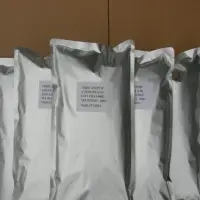-
Categories
-
Pharmaceutical Intermediates
-
Active Pharmaceutical Ingredients
-
Food Additives
- Industrial Coatings
- Agrochemicals
- Dyes and Pigments
- Surfactant
- Flavors and Fragrances
- Chemical Reagents
- Catalyst and Auxiliary
- Natural Products
- Inorganic Chemistry
-
Organic Chemistry
-
Biochemical Engineering
- Analytical Chemistry
- Cosmetic Ingredient
-
Pharmaceutical Intermediates
Promotion
ECHEMI Mall
Wholesale
Weekly Price
Exhibition
News
-
Trade Service
Autologous hematopoietic stem cell transplantation is the standard treatment for multiple myeloma (MM), but patients will still relapse after transplantation and require additional treatment.
Isatuximab is an anti-CD38 monoclonal antibody, currently approved in the United States, the European Union, Japan and other countries/regions in combination with pomalidomide and dexamethasone.
Previously received ≥2 line therapy (including lenalidomide and protease) Body inhibitors) for relapsed and refractory adult MM patients.
The phase III IKEMA study (NCT03275285) confirmed that the Kd regimen (carfilzomib combined with dexamethasone) combined with Isatuximab (Isa-Kd regimen) can bring benefits to patients with relapsed and refractory MM.
Subgroup analysis and exploration of this study The efficacy and safety of this combination scheme in MM patients who have previously received transplantation are discussed.
The results of the study will be announced at the 47th Annual Meeting of the European Association of Blood and Bone Marrow Transplantation (EBMT 2021) in 2021.
The editor organizes the main content as follows for the reference of readers.
01 Research Methods The study included MM patients who had previously received 1-3 lines of treatment, and randomly assigned them to receive the Kd regimen or the Isa-Kd regimen at a ratio of 3:2 until the patients developed disease progression or intolerable adverse events.
When the study observed 65% of the progression-free survival (PFS) events expected by the Independent Review Committee (IRC), an interim efficacy analysis was performed.
02 Results of the study 302 patients (179 Isa-Kd group, 123 Kd group) received randomization, 116 patients in the Isa-Kd group and 69 patients in the Kd group had previously received ≥1 autologous transplantation.
The median age of patients in the Isa-Kd group was 61 years (range: 37-76 years), and the median age of patients in the Kd group was 61 years (range: 39-75 years).
Among the patients in the Isa-Kd group who had previously received transplantation, 40.
5% of patients had previously received first-line treatment, and 59.
5% of patients had previously received ≥2 line treatment; among the patients in the Kd group who had previously received transplantation, 47.
8% of patients had previously received After first-line treatment, 52.
2% of patients had previously received ≥2-line treatment.
In the Isa-Kd group, 7.
8% of the patients had stage III disease, 23.
3% had high-risk cytogenetic factors; 5.
8% of the Kd group had stage III disease, and 26.
1% had high-risk cytogenetic factors.
In the study, the PFS of the overall population of patients in the Isa-Kd group (not achieved [Isa-Kd] vs 19.
15 months [Kd]; HR: 0.
531; 99% CI: 0.
318-0.
889) and PFS of transplanted patients (not achieved [Isa-Kd] vs 19.
15 months [Kd] Isa-Kd] vs 19.
15 months [Kd]; HR: 0.
578; 99% CI: 0.
353-0.
945) longer.
In the overall population, the CR rate (39.
7% vs 27.
6%) and minimal residual disease (MRD) negative rate (29.
6% vs 13.
0%) in the Isa-Kd group were higher; among the transplanted patients, the Isa-Kd group The CR rate (43.
1% vs 29.
0%) and MRD negative rate (31.
9% vs 13.
0%) also showed advantages.
Among the transplanted patients, the median duration of treatment in the Isa-Kd group was longer (80.
0 weeks vs 61.
6 weeks), and there was a higher probability of concurrent ≥ grade 3 treatment-related adverse events (TEAE) (76.
5% vs 58.
8%).
However, in the two groups of patients who had received transplantation, the incidence of severe TEAE (53.
0% vs 51.
5%), grade 5 TEAE (3.
5% vs 1.
5%), and TEAE (8.
7% vs 8.
8%) were close.
The most common grade ≥3 TEAEs in Isa-Kd and Kd transplanted patients were hypertension (17.
4% vs 14.
7%) and pneumonia (13.
9% vs 8.
8%). 03Research conclusions Based on the Kd scheme combined with Isatuximab can improve the PFS and disease remission of MM patients after transplantation, while the safety is controllable, which is consistent with the benefits observed in the IKEMA study population.
The results of this study support the use of the Isa-Kd regimen in MM patients after transplantation.
Reference source: T.
Martin, M.
Capra, M.
Mohty, et al.
Isatuximab plus carfilzomib and dexamethasone cersus carfilzomib and dexamethasone in relapsed multiple myeloma patients who previously underwent transplantation: IKEMA subgroup analysis.
The 47th Annual Meeting of the EBMT.
Abstract Meeting OS21-3.
Poke "read the original text", we will make progress together
Isatuximab is an anti-CD38 monoclonal antibody, currently approved in the United States, the European Union, Japan and other countries/regions in combination with pomalidomide and dexamethasone.
Previously received ≥2 line therapy (including lenalidomide and protease) Body inhibitors) for relapsed and refractory adult MM patients.
The phase III IKEMA study (NCT03275285) confirmed that the Kd regimen (carfilzomib combined with dexamethasone) combined with Isatuximab (Isa-Kd regimen) can bring benefits to patients with relapsed and refractory MM.
Subgroup analysis and exploration of this study The efficacy and safety of this combination scheme in MM patients who have previously received transplantation are discussed.
The results of the study will be announced at the 47th Annual Meeting of the European Association of Blood and Bone Marrow Transplantation (EBMT 2021) in 2021.
The editor organizes the main content as follows for the reference of readers.
01 Research Methods The study included MM patients who had previously received 1-3 lines of treatment, and randomly assigned them to receive the Kd regimen or the Isa-Kd regimen at a ratio of 3:2 until the patients developed disease progression or intolerable adverse events.
When the study observed 65% of the progression-free survival (PFS) events expected by the Independent Review Committee (IRC), an interim efficacy analysis was performed.
02 Results of the study 302 patients (179 Isa-Kd group, 123 Kd group) received randomization, 116 patients in the Isa-Kd group and 69 patients in the Kd group had previously received ≥1 autologous transplantation.
The median age of patients in the Isa-Kd group was 61 years (range: 37-76 years), and the median age of patients in the Kd group was 61 years (range: 39-75 years).
Among the patients in the Isa-Kd group who had previously received transplantation, 40.
5% of patients had previously received first-line treatment, and 59.
5% of patients had previously received ≥2 line treatment; among the patients in the Kd group who had previously received transplantation, 47.
8% of patients had previously received After first-line treatment, 52.
2% of patients had previously received ≥2-line treatment.
In the Isa-Kd group, 7.
8% of the patients had stage III disease, 23.
3% had high-risk cytogenetic factors; 5.
8% of the Kd group had stage III disease, and 26.
1% had high-risk cytogenetic factors.
In the study, the PFS of the overall population of patients in the Isa-Kd group (not achieved [Isa-Kd] vs 19.
15 months [Kd]; HR: 0.
531; 99% CI: 0.
318-0.
889) and PFS of transplanted patients (not achieved [Isa-Kd] vs 19.
15 months [Kd] Isa-Kd] vs 19.
15 months [Kd]; HR: 0.
578; 99% CI: 0.
353-0.
945) longer.
In the overall population, the CR rate (39.
7% vs 27.
6%) and minimal residual disease (MRD) negative rate (29.
6% vs 13.
0%) in the Isa-Kd group were higher; among the transplanted patients, the Isa-Kd group The CR rate (43.
1% vs 29.
0%) and MRD negative rate (31.
9% vs 13.
0%) also showed advantages.
Among the transplanted patients, the median duration of treatment in the Isa-Kd group was longer (80.
0 weeks vs 61.
6 weeks), and there was a higher probability of concurrent ≥ grade 3 treatment-related adverse events (TEAE) (76.
5% vs 58.
8%).
However, in the two groups of patients who had received transplantation, the incidence of severe TEAE (53.
0% vs 51.
5%), grade 5 TEAE (3.
5% vs 1.
5%), and TEAE (8.
7% vs 8.
8%) were close.
The most common grade ≥3 TEAEs in Isa-Kd and Kd transplanted patients were hypertension (17.
4% vs 14.
7%) and pneumonia (13.
9% vs 8.
8%). 03Research conclusions Based on the Kd scheme combined with Isatuximab can improve the PFS and disease remission of MM patients after transplantation, while the safety is controllable, which is consistent with the benefits observed in the IKEMA study population.
The results of this study support the use of the Isa-Kd regimen in MM patients after transplantation.
Reference source: T.
Martin, M.
Capra, M.
Mohty, et al.
Isatuximab plus carfilzomib and dexamethasone cersus carfilzomib and dexamethasone in relapsed multiple myeloma patients who previously underwent transplantation: IKEMA subgroup analysis.
The 47th Annual Meeting of the EBMT.
Abstract Meeting OS21-3.
Poke "read the original text", we will make progress together







